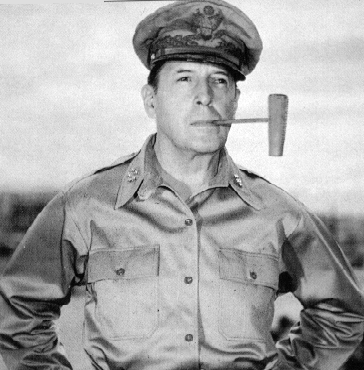 Rockefeller, one of John D. Rockefeller's four grandsons. As the second
world war was drawing to a close, the U.S. was preparing for a massive
invasion of the Japanese home islands.
Rockefeller, one of John D. Rockefeller's four grandsons. As the second
world war was drawing to a close, the U.S. was preparing for a massive
invasion of the Japanese home islands.The military had stockpiled vast supplies of weapons and munitions on the island of Okinawa. Some sources claim that with Vice-governor Laurence Rockefeller's assistance most of the armaments were sold to the leader of Vietnam, Ho Chi Minh, for something like one U.S. dollar and Ho’s "goodwill." One might wonder why these expensive and critical military supplies were "given" to the North Vietnamese.
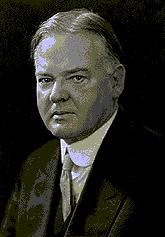 To answer that question we
have to go to an almost unknown study in the 1920's prepared by a man
named Herbert Hoover, later to become President of the United States.
The study showed that one of the world's largest oil fields ran along
the coast of the South China Sea right off French Indo-China, now known
as Vietnam. This was before offshore drilling had been invented and
before a man named George Herbert Walker Bush was to become the CEO of
a world-wide offshore drilling company.
To answer that question we
have to go to an almost unknown study in the 1920's prepared by a man
named Herbert Hoover, later to become President of the United States.
The study showed that one of the world's largest oil fields ran along
the coast of the South China Sea right off French Indo-China, now known
as Vietnam. This was before offshore drilling had been invented and
before a man named George Herbert Walker Bush was to become the CEO of
a world-wide offshore drilling company.In 1945, Vietnam was still a colony of the French. Laurence Rockefeller, it appears, had given the
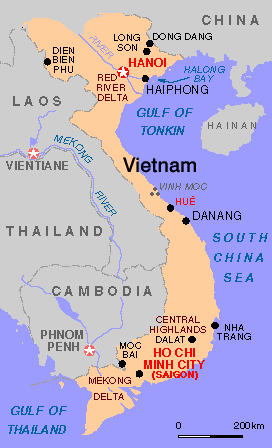 extensive store of weapons to Ho Chi Minh with the hope that Vietnam
would drive out the French so that Standard Oil would be able to take
over the as yet undeveloped offshore fields. But in 1954, Vietnamese
General Giap finally defeated and drove out the French at Dien Bien Phu
with weaponry provided by the U.S. Ho Chi Minh reneged on the deal
since he could read too, and he was well aware of the Hoover resource
report, and knew there was a vast supply of oil off the Vietnamese
coast.
extensive store of weapons to Ho Chi Minh with the hope that Vietnam
would drive out the French so that Standard Oil would be able to take
over the as yet undeveloped offshore fields. But in 1954, Vietnamese
General Giap finally defeated and drove out the French at Dien Bien Phu
with weaponry provided by the U.S. Ho Chi Minh reneged on the deal
since he could read too, and he was well aware of the Hoover resource
report, and knew there was a vast supply of oil off the Vietnamese
coast. "In the 1950's a method of undersea oil exploration was perfected which used small explosions deep in the water and then recorded the sound echoes bouncing off the various layers of rock below. The surveyor could then determine the exact location of the arched salt domes which hold the accumulated oil beneath them. But if this method were used off the Vietnam coast on property Standard didn't own or have the rights to, the Vietnamese, the Chinese, the Japanese and probably even the French would quickly run to the United Nations and complain that America was stealing the oil, and that would shut down the operation.
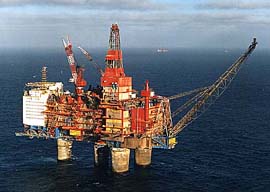 "In 1964, after Vietnam was divided into North and South, and the
contrived Gulf of Tonkin incident, several U.S. aircraft carriers were
stationed offshore of Vietnam and the 'war' was started. Every day jet
planes would take off from the carriers, bomb locations in North and
South Vietnam, and then using normal military procedure when returning
would dump their unsafe or unused bombs in the ocean before landing
back on the carriers. Safe ordnance drop zones were designated for this
purpose away from the carriers.
"In 1964, after Vietnam was divided into North and South, and the
contrived Gulf of Tonkin incident, several U.S. aircraft carriers were
stationed offshore of Vietnam and the 'war' was started. Every day jet
planes would take off from the carriers, bomb locations in North and
South Vietnam, and then using normal military procedure when returning
would dump their unsafe or unused bombs in the ocean before landing
back on the carriers. Safe ordnance drop zones were designated for this
purpose away from the carriers."Even close-up observers would only notice many small explosions occurring daily in the waters of the South China Sea and thought it was only part of the 'war.' The U.S. Navy carriers had begun Operation Linebacker One, and Standard Oil had begun its ten year oil survey of the seabed off of Vietnam. And the Vietnamese, Chinese and everybody else around, including the Americans, were none the wiser. The oil survey hardly cost Standard Oil a nickel, the U.S. taxpayers paid for it." -- Marshall Douglas Smith. (2001). Black Gold Hot Gold, Ch. 3
So twenty years later and 57,000 Americans and half a million Vietnamese dead, Standard Oil had enough data and the war in
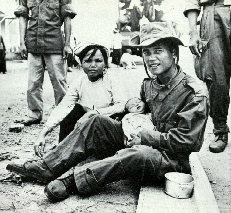 Vietnam could end. Nelson Rockefeller's
personal assistant, Henry Kissinger, represented the U.S. at the
Vietnam/Paris Peace talks and won a Nobel Peace Prize in the bargain.
Vietnam could end. Nelson Rockefeller's
personal assistant, Henry Kissinger, represented the U.S. at the
Vietnam/Paris Peace talks and won a Nobel Peace Prize in the bargain.After the dust had settled from the war, Vietnam divided their offshore coastal area into numerous oil lots and allowed foreign companies to bid on the lots, with the proviso that Vietnam got a percentage of the action. Norway's Statoil, British Petroleum, Royal Dutch Shell, Russia, Germany and Australia all won bids, and began drilling within their areas. Strange it was that none of them struck oil. However, the lots which Standard Oil bid for and won proved to have vast oil reserves. Their extensive undersea seismic research appears to have paid off.
Contintued in Afghanistan.